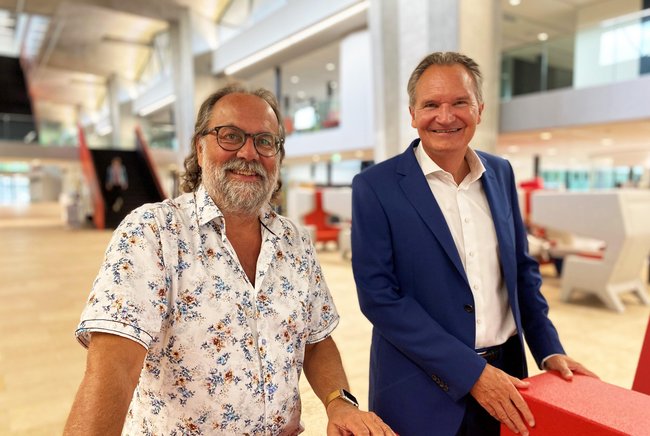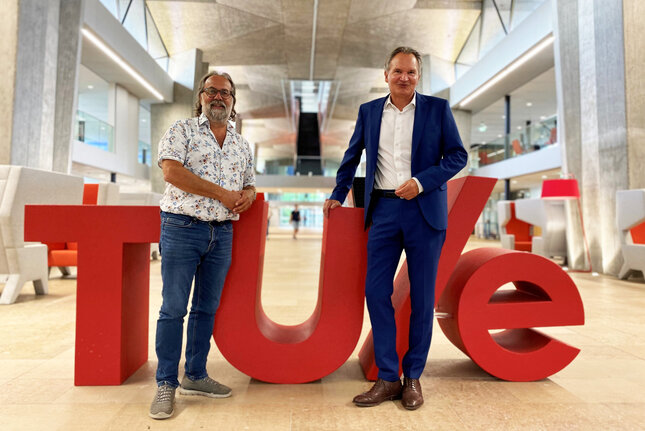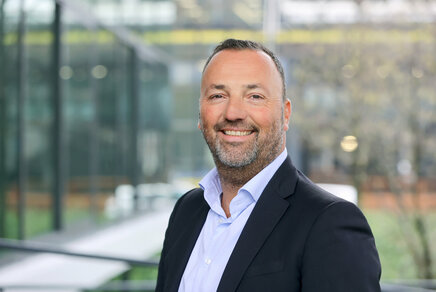'We want to be a university that feels small, but is big'
Executive Board President Robert-Jan Smits and Maarten Steinbuch, chairman of the 'leap of scale' think tank share the first ideas on the ambitious growth plans of TU/e.

The Brainport region is fast becoming the engine of the Dutch economy, say Professor Maarten Steinbuch and Executive Board President Robert-Jan Smits. The high-tech region is growing and growing, and this is accompanied by an enormous number of job vacancies. In order to fill these vacancies, our university, as an indispensable supplier of talent in this region, must have doubled its graduate outflow well before then. Steinbuch is leading the TU/e think tank that will shape the approach to this 'leap of scale'. "As the only university in this region, TU/e will maintain an important role. We want to be a university that feels small, but is big," says Steinbuch. Smits and Steinbuch discuss the initial findings and major challenges.
We have to wait our turn before being able to take a picture of university president Robert-Jan Smits and initiator of the leap of scale think tank Maarten Steinbuch next to the life-size TU/e logo in the Atlas building. A brand-new Indian alumnus has his picture taken with his master's degree in his hand beside the logo. Smits congratulates the proud Master of Science and asks him what he will be doing next. The answer: working at ASML. "A great company to work for," says Smits approvingly. It's no coincidence, because this conversation follows right after Steinbuch and Smits discuss the growth of our university in the future aimed at filling the enormous amount of vacancies that are expected in the Brainport region in the coming years. This will mainly to be sought in the growth of the number of master's students both within and outside the European Economic Area.
It has been more than two months since we spoke about the leap of scale that the Brainport region is making and the growth scenario for our university. What have been the reactions within the TU/e community to the news that we want to double the outflow?
Smits: "We've had various reactions, more positive than negative. We've just come out of a difficult period with COVID, there's a lot of work pressure; people want to know what growth will mean to them. We totally understand that. On the other hand, our community also sees enormous opportunities. The Brainport region is becoming the leading region in the Netherlands, and our university is a key player in that."
Steinbuch: "The high-tech industry just keeps on growing. Within twenty years' time our Brainport region will be the center of gravity for the industry in the Netherlands. It is more than just ASML, it is also about the manufacturing industry that provides unique services and products with smart software for the whole world. For instance Philips, FEI, VDL, NXP, DAF and Prodrive. People enjoy working at TU/e because they feel that we are taking on a completely different role than we have always had to date. Everyone feels that vibe, feels that something very special is about to happen."
Smits: "Some people fear that our uniqueness will disappear if we grow so much, but it doesn't have to. You can grow and still keep the atmosphere and a sense of community."
Steinbuch: "We have short lines here, with scientists responding quickly to students when they have a question. We want to preserve this culture. We don't want the monster images of gigantic lecture halls with thousands of students. We want to be a university that feels small, but is big. And we've done that before, because we've already grown from 6,500 to 13,000 students in recent years. So it can be done."
At their first meeting, professor Maarten Steinbuch told then-new university president Robert-Jan Smits that in his view TU/e is much too small for the region it is located in. "Based on the companies in the Brainport region, we should be three times as big, Steinbuch argued back then. I have always remembered that," Smits says now, years later. It was therefore immediately clear to him that Steinbuch would have to lead the TU/e think tank on the leap of scale.
Who else is in the think tank and what is the task of this TU/e group?
Smits: "The Executive Board created the think tank with the following task: 'Assume a situation in 2030 in which we have doubled the outflow of students, we have responded more than ever to the demand from the region and have increased the stay rate of graduates in Brainport. What needs to be done to achieve these goals?'
Steinbuch: "The think tank is a small group with Mark van den Brand (Mathematics & Computer Science), Patricia Dankers (Biomedical Engineering), Marion Matters (Electrical Engineering), Patrick Groothuis (Education & Student Affairs), Renee Westenbrink (General Affairs) and Xavier Theunissen (support). We have been given the task to think about what we want with the leap of scale, what problems we can expect, and what the solutions may be."
What are your initial findings?
Steinbuch: "We have discussed where the growth should come from. An important starting point is that it's not about doubling the size of the entire university," Steinbuch emphasizes. "We think the really big steps can be made in the external influx of master's students, EngD trainees and PhD students. Preferably from the Netherlands, but because that intake is currently declining, we are also looking inside and outside the European Economic Area."
"The two-year EngD post-master programs for technological designers that we offer in a 4TU context are unique, but the programs have never reached full maturity. We now have 250 trainees in these programs; we could do with 1,000 or 2,000. The puzzle is how to get there," says Steinbuch.
"The master phase has a strong master-apprentice relationship, we think we can maintain that if we make sure we first make sure we bring in more scientific staff.” For that, one thing is essential: money. Steinbuch: "In order to handle more students, the organization must first grow. To do so, we need funding. The think tank has coined the creative term up-front funding. Normally, as a university, you only get money when a student graduates. First you scale up, then more funding comes in from the government, which generates more scope to hire people."
"We want to reverse this in order to make growth possible: first we need more scientific staff, then more facilities and buildings and support services, and only then do we want to grow the student numbers. This way we want to relieve the staff and grow gradually, so that it happens in the right proportions. This will also allow the research component to grow at the same rate and enable us to educate and deliver more PhD students. We are also looking at how the high-tech industry in Brainport can be more involved in the training of master's students. In particular, there are many opportunities in this regard for internships, guest lecturers and graduation supervision. This could relieve the workload within TU/e considerably."
We turn it around: more staff first, then more students
Maarten Steinbuch, think tank leader for the leap of scale

Where do you see the scope - and need - for growth within TU/e in the future?
Steinbuch: "If there are 100,000 new jobs in this region, everyone will be needed. We think that all our master's programs can grow, but expect that there will be a particularly high demand for mechanical and electrical engineers, mathematicians, computer scientists, but also physicists, industrial engineers, biomedical engineers and chemists. The themes of artificial intelligence, data, and systems engineering will become really important." Steinbuch emphasizes that these are initial ideas from the think tank, and that input from the TU/e community is very welcome.
"We are thinking about how existing master programs can grow, but we are also brainstorming about new master or EngD programs, for example for high-tech systems. Our university should also play a role in circular engineering. How can we design devices, such as the wafer steppers made by ASML, in such a way that they can be recycled properly? That involves knowledge from many of our departments."
Does the think tank also talk to companies in the region about what is needed, and where the need lies?
Steinbuch: "We have spoken with ASML and they have indicated a need for professionals in optics and mechatronics. However, you don't always get clear answers when you put the question to the industry: 'we want to grow, let us know where'. We now want to draw up our own basic outline first, and present it to companies and ask them for input."
Where is everyone going to live?
Smits says firmly: "We are and will remain an on-campus university, so we will not absorb the growth by teaching online. The question is whether our campus offers enough space for the growth, or whether there are other interesting locations to teach at."
Steinbuch: "If we expand so enormously, we will need new buildings." Steinbuch cites as examples Gemini, which houses Mechanical Engineering and Biomedical Engineering, and Flux, which houses Electrical Engineering and Applied Physics.
"The think tank has not yet discussed how and if we will make use of other campuses in the region. It is interesting to see what we can do for each other in this respect. The campuses are very strong if you can combine them with knowledge institutions. We're open-minded and hope to be able to collect ideas from our community for that as well."
Smits: "On October 31st and November 1st, we will be holding the Strategy Days, during which we will be discussing the strategy, including the leap of scale, with the deans and heads of department. This will be followed by TU/e-wide meetings - townhall meetings - to which we invite the entire community to contribute ideas. Then there will be working groups for sub-areas such as housing and financing.
"We find it important for everyone to be able to contribute ideas. I was therefore very pleased that researchers such as Rick de Lange and Boudewijn van Dongen came to us with their own ideas after news of the growth came out. Although we got it started, we don't want to work out the details top-down; everyone is entitled to have their say."
The four conditions for growth
The university is prepared to grow along with the Brainport region, subject to four conditions:
-
Up-front government funding to facilitate growth and to prevent the current workload from increasing further.
-
Growth should not come at the expense of excellence.
-
Growth should be gradual to keep the workload manageable.
-
The region must ensure that the infrastructure and facilities are in order.
When do you expect a decision on one of the four conditions for growth: more money from the government?
Smits: "We are working on the leap of scale on many fronts. Within TU/e, within Brainport, in The Hague. Everyone sees the importance of it. The Brainport region is the only area mentioned in the coalition agreement. In mid-September, ministers will be meeting to discuss this again. We still hope that by the end of this year there will be more clarity about the money needed for growth. If there is no up-front funding, we cannot start up tenders for new buildings, nor start recruiting additional staff."
Where is the biggest challenge right now, besides money?
Steinbuch and Smits in chorus: "Housing! "
Smits: "The dire situation around housing for students is high on everyone's agenda, including The Hague. More housing is needed, but we cannot solve that as a university. The region has to do that. Yet I see more opportunities than ever. I am glad that a consensus is emerging within our community that we must continue to grow."
Steinbuch: "We will become the most important industrial center in the Netherlands. I recently saw a video on LinkedIn of an American equity analyst who said: 'There is only one company in the whole world that is the most important for the future, and that is ASML. Because everything revolves around chips and who determines that? ASML.' And then Eindhoven shouts: 'but we want to stay small'. That's just not possible! Of course, it's not just about ASML, but about the entire manufacturing industry around it. I feel that enormous drive to grow every day when I'm in the region. That includes a very strong university that plays its part."
Smits concludes: "Every job at ASML generates three other jobs at suppliers. Our region makes an enormous contribution to the future, it is wonderful that this is being recognized. This recognition is already evident from the guest speakers at our opening of the academic year: European Commissioner for the Internal Market Thierry Breton, ASML CEO Peter Wennink, and Minister of Economic Affairs and Climate Policy Micky Adriaansens. Eindhoven is in the picture."
More on our strategy


![[Translate to English:] [Translate to English:]](https://assets.w3.tue.nl/w/fileadmin/_processed_/c/f/csm_BvOF_2024_0319_AEV_license_TUe_Dirk_van_Meer_-_CORE_1__c976e259a5.jpg)